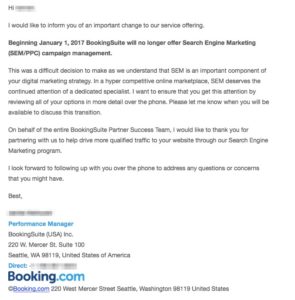On November 30th of this year, Booking/Priceline is shutting down its BookingSuite product, likely affecting hundreds of hotels worldwide. In short, they will stop running websites, booking engines, and revenue management software for their hotel clients. Even with the volume of hotels they amassed on their platform, the headache is clearly not worth it to them anymore. Sadly, they timed the shutdown during the toughest year on record for the hotel and travel industry. In addition to dealing with the pandemic, hotels on their platform now need to gather their digital assets and go vendor hunting. That’s not an easy task even in the best of times.
This is not the first or last time a crisis like this has hit our industry. In fact, it’s a lot like the hospitality industry’s version of Groundhog Day (Palm Springs for younger readers). The free/cheap/rentable/leased hotel website trap has sprung and once again hundreds of hotels are trapped. Why is it so hard for us to learn from history? If only someone were writing about digital asset management for hotels, warning us about a likely collapse of their digital assets platform?
BookingSuite’s demise in the middle of a global pandemic is yet another opportunity for hotels to learn that software companies are not their friends. Their core focus is their own balance sheet and profits. Concern for the long-term profitability of your hotel asset lies with you alone. The cheapest option will almost always end up costing you more in the end.
Here are some renewed thoughts on owning, managing and investing in your digital assets and revenue.
Play It for Me One More Time
History repeats itself, sometimes very quickly. Let’s take a quick look back at the BookingSuite origin story.
It starts like all hotel software disaster stories… with an acquisition. Booking.com acquired Buuteeq, a company peddling $150-$500/month websites to hotels and small inns. The platform was designed to churn out cheap, quick websites using templates and as little effort as possible. The operative word was cheap, and it took off in an industry that is always reluctant to make digital investments.
As with any typical hotel tech startup, funding was deployed on heavy sales and marketing, including paid speaking slots at hospitality conferences. “It’s cheap and I don’t have to do any work? Sign me up!” is how the industry responded. Hundreds upon hundreds of hotels jumped on the opportunity to rent their “most profitable channel” for a few hundred dollars a month.
Then one morning, hotels woke up to find that their most profitable channel was now a part of Booking.com (the word’s biggest Online Travel Agency)… you know, the guys they thought they were battling by spending a few hundred dollars on their Buuteeq websites and marketing plans.
At that point everyone came to their senses and started planning how they would manage their own digital assets, right? Nope. Status quo prevailed and people forgot.
A few years later in 2020, the alarm clock beeps at 6am, and I Got You, Babe starts playing on the radio…again. And I am writing yet another article on the importance of owning your digital assets.
Making a Bigger Boat
BookingSuite was run by some of the smartest people in the travel business. The Priceline Inc. empire knows a thing or two about making money. They quickly capitalized on the fact that hotels are always reluctant to spend on digital assets. With a marketing budget and knowledge base infinitely bigger than Buuteeq’s, Booking.com did what it knows to do: scale quickly and make more money! To take things to another level, they were going to need a bigger boat.
So, they expanded the product line by adding a booking engine (aka booking button) and revenue management software (which was made possible by their acquisition of a company named Price Match, based out of Paris). And just like that, a façade of “direct revenue channel presence” could be achieved cheaply. Owners and managers scratched it off their to-do lists and in one swoop migrated everything over.
Next, BookingSuite got rid of those pesky monthly retainers and switched to a straight-up 10% commission model. So get this: A typical hotel on the BookingSuite platform was already paying them a 10-15% commission on inventory sold on Booking.com. Now, in addition to that, the hotels started paying them a 10% commish on every room sold on their own hotel website! A racket so deep, it would make Tony Soprano blush.
I have mentioned this a lot in my previous articles, but I have to say it again so please take note: Booking.com is really, really good at making money. I wish hotels would watch and learn to operate with the same passion for revenue.
Titanic, Meet Iceberg
There were clear warning signs. This iceberg in the open waters was spotted by yours truly back when Booking took over Buuteeq and got into the hotel digital asset game. None of their acquisitions are designed to help hotels make more money. The goal for them has always been to gain insights and maximize their own profits.
Looking back, you can clearly see the warning shot they fired when they shut down online marketing services back in 2017. The smart folks at BookingSuite very quickly figured out that offering online marketing services for hotels was not worth their time. So, in the peak of the travel boom in 2017, they sent an email announcing their OG “difficult decision” of shutting down their SEM (Google AdWords) services.
They wanted to shift focus to activities where they could make money from you without actually doing too much work. Here is the email they sent back in the day.
Three years later, they pulled the plug on the whole BookingSuite program. No surprise.
Another Day, Another Difficult Decision
Fast forward to 2020, when another “difficult decision” email strikes inboxes across the globe. This time they are removing the trifecta of digital services: your hotel website, booking engine and revenue management software. If your hotel website and/or booking engine and/or revenue management system was with BookingSuite…then I think the “decision” part was made by them, but the “difficult” part is 100% your problem now.
Years of renting cheap digital assets and software has caught up with the industry, again. Hundreds of hotels are scrambling for support in the middle of the pandemic. Many are left with a zip file of their website, content, and photos (aka, their most profitable channel). If you have been reading my articles for a while, you know that owning your biggest digital asset is something I am very passionate about. Yet even in 2020, hotels are still not knowledgeable: they choose to be in the dark.
Shady agencies touting the gospel of direct revenue are also helping to make sure that the hotels working with them stay trapped in website content management system (CMS) dependency. Most agencies outsource all their work (eg, to India or Colombia), where your hotel website is managed in a digital sweatshop. Of course, you are assigned an overworked “account manager” here in the US who is simply forwarding emails all day to you and dozens of hotels just like you. I actually do not like the smell of cheap, generic strategy in the morning.
As these agencies grow, they super-optimize their offering and everything starts to look the same. This is the biggest reason we have a plague of sameness across the hundreds of design-heavy, content-free hotel websites; the same “book direct and save” Google Ads; the same social media posts; the same 50% off email newsletters. Yes, those drone videos, hyperbolic adjectives in content, and cliché photography all come from the same place.
Why would you choose to be an independent hotel if you want to use cookie cutter digital assets and strategy? Hotel brands have already achieved this level of mass production. Big brand hotels have dedicated vendors for conformity, from websites to toilet paper. Why masquerade as an independent hotel when everything you do is in the style of a brand hotel? Maybe it’s time to make a switch to digital independence.
A Brief Guide to Avoiding Worst Case Scenarios
You can prevent yourself from experiencing a vendor-induced disaster. You don’t have to let the next big industry acquisition destroy your digital assets. Here is a list of things you can protect today:
- Domain: This is the cheapest and simplest digital asset to always have registered in your name. Maintain ownership via a dedicated email address, phone number and address. Also, don’t be cheap; renew domains for 10+ years whenever you can. Having rescued several domains for hotels during acquisitions, I am here to tell you: do not take domain ownership lightly. I have seen/experienced some awful scenarios… I might write a horror series about it one day.
- Website: Never rent a website. That super low monthly fee or installment is going to come back one day and bite you. A proprietary content management system that is exclusive to your design or marketing agency is another red flag. And before you get caught up in the sales pitch, remember: If you are not using an open source platform like WordPress, you are going to eventually regret that decision. Don’t end up like Sisyphus, cursed to start from scratch time and time again. Please read this article every time someone tries to scare you out of using an open source CMS like WordPress. Remember, any design and any kind of website can be powered by WordPress, so you are free to pick any designer and any marketing agency you like. Just let them know you prefer to own your digital assets. If they protest…find another agency.
- Revenue Management Software: Many RMS systems claim to be built on magical, AI-powered, Machine Learning software. I don’t expect you build one for yourself using open source software. So, short of getting a team of engineers and data scientists, how can you protect yourself? The answer lies in something you provide to the RMS system every day so it can do its job: Data. No matter how established you think your vendor is, remember that they are one acquisition away from disappearing on you. As a small hotel, you can back up all your data using a simple service like Office 365. Larger management companies must invest in something more complicated and back up everything on Amazon Web Services, Microsoft Azure or Google Cloud. RMS systems cannot do anything without your data, but please don’t rely on them to keep it safe for you. Your vendor might love you today, but do you think it will last forever? As Outkast aptly pointed out back in 2000:
“I hope we feel like this forever
Forever, forever, ever, forever, ever?” - Hotel Booking Engine: As with the RMS, I’m not expecting you to hire a team of developers and code writers to make you an online shopping cart. This is a service you will have to buy. But you still need to look after your data. The most useful data export from a booking engine or shopping cart is your e-commerce conversion data. This info ties directly into analytics data from your other crucial digital asset, your website. Do not leave your historical data in the hands of a hotel marketing agency/vendor. I have been a Google Analytics evangelist for as long as I have been in this business. Do not let agencies push you into using expensive analytics programs like Adobe Site Catalyst (Omniture, for old people like me). Open a Google Analytics account that is owned by you and is 100% integrated into your booking engine to retain all of your e-commerce conversion data. That is your gold mine to hold onto when someone decides to pull the plug on you. Software is great; data is greater. If your vendor pulls the rug out from under your feet, you may fall hard… but you can retain your data and some dignity before you start with a new vendor.
- Marketing Campaigns: You’ve probably figured out what I’m going to say already: make sure you own your hotel marketing campaign. Paid search marketing is a powerful tool, but you must own the relationship with Google via your own corporate, hotel, or personal credit card. Set up a generic Gmail address that you control and make sure your vendor builds out the campaign for you using that address. Then, if your vendor ever makes the difficult decision to stop working with you, you can walk away with your own campaigns, which you have been paying for for years.
A Few Good Agencies
Yes, there are still a few good agencies and software vendors that are passionate about what they do. They are not looking to grow fast so they can sell themselves to a conglomerate. They are run by owners who are directly involved in working with you, and they are willing to help you own, run and manage effective websites built on open source platforms. These are the people who have cut back their retainers during the pandemic while continuing to support their clients at the same level of service. If you do decide to leave them at any stage, it is not a disaster. They won’t leave you with nothing but a zip file. If they are in it for the long haul, they are more interested in maintaining their integrity and reputation.
Now more than ever, marketing and digital innovation will be ushered in by smaller, smarter and leaner teams. Innovation requires hard work hard and commitment. The few good ones are hard to find, so do your research and ask questions. Clue: The larger they are, the more likely they are to cash out at the first opportunity to sell their business.
Conclusion
The bad habit of renting digital assets has already cost the hotel and lodging sector a lot of time and revenue. Restarting from scratch is a hard option, especially when it comes to your hotel’s digital presence. Your digital assets deserve the same respect as your physical assets. The alternative is to repeatedly to pay the heavy price of losing revenue and momentum every time you bounce from one low-cost vendor to another. This latest disaster for hotels might be caused by Booking.com, but hotels that chose to rent their digital assets have 100% responsibility here. When you sign up for something that is too good to be true, don’t be surprised when it doesn’t work out in the long run. My goal here is to highlight a simple fact, over and over and over: Please invest in owning your digital assets and marketing campaigns. Then work with the right people and watch your revenue grow. Vendors will come and go, but your momentum and your profits should always stay with you.









